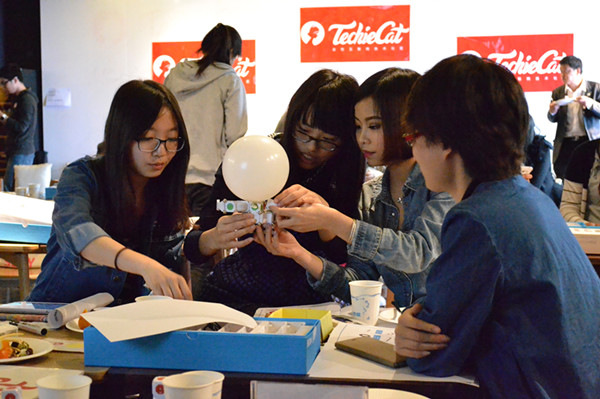
Women interested in technology attend TechieCat's workshop in DotGeek Cafe in Zhongguancun, Beijing's innovation hub on May 9, 2015. (Photo courtesy of TechieCat)
(ECNS) – That China's technology sector is male dominated isn't new information, but the industry is gradually becoming more favorable for women.
At a workshop on May 9 in a café called DotGeek in Zhongguancun, Beijing's innovation hub, 22 women attended two panels on web development and internet security, and in teams of three and four, breathed life into their Moss robots.
The workshop was held by TechieCat, a community working to bring technology closer to women. According to its director, Gu Xi, over 70 women applied for the workshop, far exceeding their class quota of 24.
"We're totally surprised and satisfied with the turnout, as it's been held only twice in Beijing and once in Shanghai," Gu said. "We're delighted to see more and more women interested in technology."
The attendees included programmers at big tech firms such as Youku Tudou, one of China's largest online video sites, as well as women who have little knowledge in coding.
Scarlett Zhang, a sophomore majoring in International Trade at Beijing Language and Culture University, said she hopes that learning programming will bring new career opportunities.
"I've already bought books. I may consider being a web designer when I graduate," she said.
"I think women are definitely entering the sector," said TechieCat's founder Thomas Yao, who used to be a mentor at Rails Girls, a female tech community that originated in Finland.
Internet firms have been improving their staff diversity with the rise of China's "sheconomy."
At Alibaba, 49 percent of the staff are female, and 34 percent of the senior roles are filled by women. Of the company's 18 founding members, six are women.
Jack Ma, Alibaba's co-founder and executive chairman, made the statement at the Global Conference on Women and Entrepreneurship held by the company on May 20 in Hangzhou. The conference was attended by famous female entrepreneurs and celebrities such as Arianna Huffington, founder of the Huffington Post, and Jessica Alba, a renowned actress.
With the majority of its clients being female, the e-commerce giant considers its women employees as the "secret sauce" of success, Ma said. He said women tend to have a much broader view and focus more on teamwork.
"We think female employees contribute good experience and intuition, and they perform well in operations, communications and customer service jobs. Their skills and perspectives are a good fit for our business," according to Alibaba's public relations department.
ThoughtWorks, a global software company headquartered in Chicago, also boasts a diverse staff.
"We try to maintain a balanced number of male and female employees," said Wei Zhaoyu, a ThoughtWorks developer. "So I was surprised when I heard girls from other companies say they're the only females at their companies. I'm glad that at ThoughtWorks we're provided with a level playing field."
ThoughtWorks also has females working at managerial levels, such as its global CTO Rebecca Parsons. But this is not a common sight in the tech world.
According to statistics, female chief information officers only account for 4 percent in China, while female human resource managers and chief financial officers have a much higher percentage of 30 and 23 percent respectively, according to a study by accounting and business advisory firm Grand Thornton.
"I think a pyramid still exists," Gu said. "I feel that 80% of women working in IT are concentrated in entry or medium level jobs, and I see very few women as CTOs. The job requires lots of intensive work and overtime."
"I had lots of overtime hours when I started work, as our firm was vastly expanding its TV end services," said Angela Wang, application developer at Youku Tudou.
Balancing life and work is probably the hardest question for women working in technical positions. Wei said some girls may shift to product-related roles after working in engineering jobs for a while.
"I think it depends on the nature of the job. Men are generally more qualified for intensive jobs, and that's really not a gender issue," said JD.com's media director Kang Jian, who added that about one fifth of the company's technical workforce are women.
So are women encountering a hostile work environment in the "brogrammer" culture? Things may not be as bad in China as in Western countries.
According to statistics by Code Forge, a website that helps to develop and maintain IT projects, China's female coders earn an average monthly salary of 8,190 yuan ($1,320), slightly lower than the males at 8,420 yuan ($1,358). In comparison, men earn 50 percent more than their female peers in Silicon Valley, according to a study conducted by Joint Venture Silicon Valley.
"I think as more and more girls come into the sector and more of them work in high-ranking positions, there are abundant opportunities to succeed," Wang said.
Yao said there wasn't any prejudice when he considered Gu for the position as TechieCat's director.
"Why not? She's eye candy," Yao said with a joke. "The fact is, I didn't give her gender much thought. I just thought she's good and capable at the job, so I gave it to her."
Plenty of programs like TechieCat encourage girls to embrace technology.
"We try to sell the interesting part of technology to women," Gu said. "TechieCat and other communities will play an important role in serving China's growing number of female tech workers."
















































